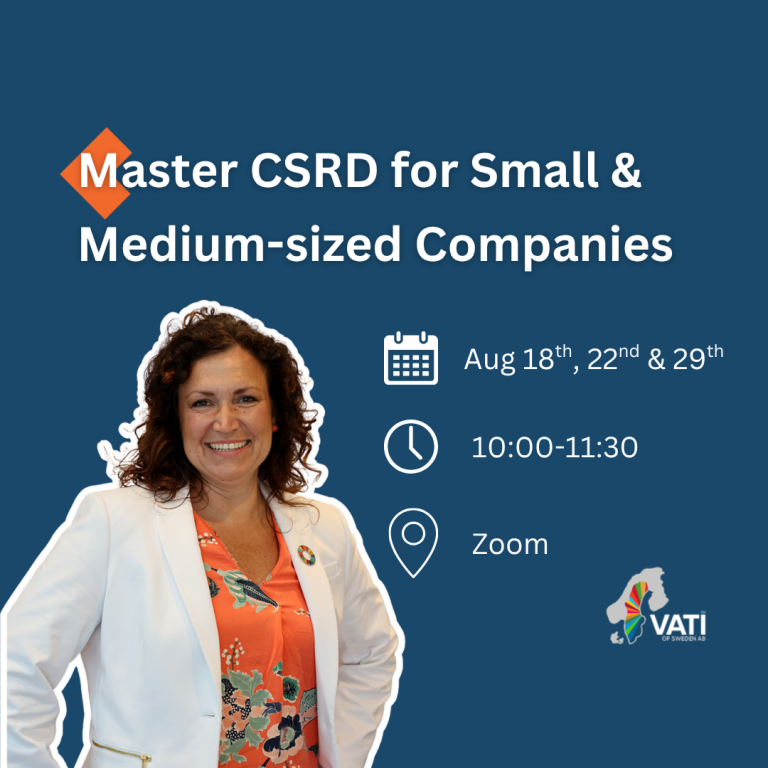An unprecedented hiring storm has stirred up companies to plan their future ESG work!
Investors, employees, consumers, and regulators are demanding that companies be more on their toes when it comes to tackling environmental, social, and governance issues from global warming and pollution to discrimination and forced labor. Most recently, the war in Ukraine has entered into the discussion about what the ESG label means.
Identifying and managing sustainability risks and reporting the results of sustainability work have become increasingly important for companies. ESG factors today are something everyone must relate to. Partly because customers and employees expect it, partly because companies must be able to manage sustainability risks to attract investors and lenders. Working actively with sustainability is crucial for companies’ survival.
The risks for companies that are perceived to move too slowly are high.
Chief sustainability officer is emerging as the new hot profession in the C-suite. The role of a CSO is a heavy position of power today in all major companies. It has far-reaching consequences for the company’s business if you do not act on your sustainability challenges and invest money in developing the company in a sustainable direction. Hiring has skyrocketed as the role shifts from one of communicating internally to delivering on business goals, such as cutting pollution.
When it started, compliance was the name of the game.
It has moved from ‘nice to do’ to ‘probably should do,’ to now, ‘must do.’
Sustainability has become a business imperative
In the last two years, it has seen more hiring for CSOs than in all previous years together without any signs of a slowdown in 2022 and the level of salary follows.
Cheryl D’Cruz-Young, a recruiter at Korn Ferry, states in an interview that a sustainability manager can earn as much as $ 800,000 to $ 1.5m.
But there’s little consensus on the job description, qualifications, or even the goals, while companies are in a hurry to staff up in the area.
Since the title isn’t even two decades old, there’s not much in the way of standardized education, and there’s no unique career path when it comes to sustainability.
Unlike members of the other managers in C-suites – those who lead established disciplines such as finance, legal and human resources – the career paths of the growing number of sustainability managers go through roles as diverse as mathematics and marketing, accounting, engineering, and agriculture, or psychology and law.
There’s no unique career path when it comes to sustainability.
The future of work offers plenty of diverse opportunities for workers hoping to make an impact. And the good news is that you don’t need to drop what you are doing, or push aside your other passions, to build a career within the field of sustainability!
If you are curious about how to shift to a career in this area, there are a few ways to get started.
First, know that this field is not going anywhere!
Businesses are reacting to consumer demands by creating new roles focused on developing ESG-friendly practices in every sector. Because these roles are new to everyone, the playing field is even. Both junior and senior employees can land them.
Second, Educate yourself on the three pillars of sustainability.
The United Nation’s definition of sustainability is “meeting the needs of the present without compromising the ability of future generations to meet their own needs.” It has three pillars: environmental, social, and economic.
The environmental pillar largely involves initiatives aimed at helping companies reduce their carbon footprint. The social pillar focuses on an organization’s people, both internally and in the external community that companies impact. The economic pillar works to ensure that companies sustainably make profits and have ethical corporate governance or management practices that are in line with the interests of their shareholders, customers, employees, and other communities.
Many international and domestic companies are rated and given an ESG (environmental, social, governance) score by accredited third-party providers that measure and verify their performance around each pillar. According to McKinsey, there have been more than 2,000 academic studies, and roughly 70% of them find a positive relationship between ESG scores and financial returns.
Third, Upskill & Reskill
As with all jobs of the future, soft skills such as creativity, adaptability, and design thinking are critical. But also the ability to work with business strategy, inclusive stakeholdership, and transformational leadership.
When it comes to sustainability, however, a couple of new categories have also emerged:
- Green skills such as circular economy, and renewable and efficient energy.
- Diversity, Equity & Inclusion is now widely regarded as business-critical. More and more people have realized that increased diversity – in addition to contributing to social sustainability – also results in better business and is important for securing innovation.
- Having knowledge of different regulations, standards and auditing suppliers about their claims are also critical areas that a CSO should be able to navigate.
Sustainability has gone from being a hygiene factor driven by stricter legislation and increased accounting requirements to becoming a competitive factor for winning business.
Fourth, Search for positions on LinkedIn
If you’re curious about what positions are currently available in your industry, search “Sustainability,” or “ESG,” under the “jobs” tab on LinkedIn. You may be surprised by the variety of roles presented.
When you apply, make sure to apply to the right companies.
Some companies may include their sustainability strategy directly on their websites. For others, this may be less obvious. During the interview process, be sure to ask about their ESG- och Sustainability related goals to make sure their values align with your own.
Eva Vati is an Entrepreneur and Business Strategist who helps Executives, Businesses, and Entrepreneurs future-proof their companies.
She is the CEO and Founder of VATI of Sweden, which is the first company in the world to give certification on integrating sustainability into business strategy. And also the Founder of VERIFY Agency of Sweden, which is the first company in the world accredited to verify organizations’ statements.







